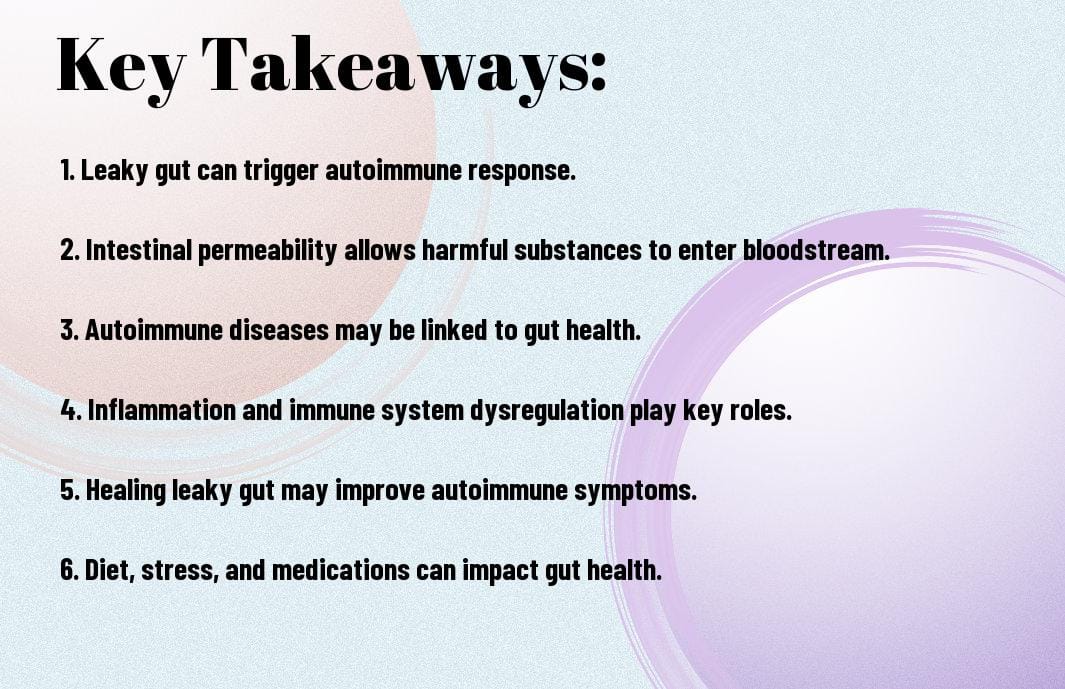It’s imperative to understand the connection between leaky gut syndrome and autoimmune diseases. Research published in Gut Microbiota, Leaky Gut, and Autoimmune Diseases highlights how intestinal permeability can lead to the development of various autoimmune conditions. By delving into the intricate relationship between the gut microbiome and the immune system, we can gain valuable insights into the onset and progression of autoimmune disorders related to leaky gut syndrome.

Some of the most crucial functions of the gut microbiome include maintaining a healthy intestinal barrier and regulating immune responses. The intestinal barrier acts as a physical and biochemical barrier, preventing harmful substances and pathogens from entering the bloodstream while allowing for the absorption of important nutrients.
One of the key factors contributing to leaky gut syndrome is dysbiosis, an imbalance in the gut microbiome. When the balance of beneficial and harmful bacteria is disrupted, it can lead to increased gut permeability. This allows toxins, undigested food particles, and bacteria to pass through the intestinal wall and trigger an immune response.
It is important to maintain a healthy gut microbiome to support the integrity of the intestinal barrier and prevent gut permeability. By promoting a diverse and balanced microbiome through a diet rich in fiber, fermented foods, and probiotics, we can help support immune function and reduce the risk of autoimmune diseases associated with leaky gut syndrome.
To understand the link between leaky gut syndrome and autoimmune diseases, we examine into the concept of molecular mimicry. This phenomenon occurs when the body’s immune system mistakes its own tissues for foreign invaders due to similarities in their molecular structures. As a result, the immune system launches an attack on both the actual threat and the body’s tissues, leading to autoimmune responses.
Molecular mimicry is just one piece of the puzzle when it comes to the connection between leaky gut and autoimmune disorders. Zonulin, a protein that regulates the permeability of the intestinal wall, plays a crucial role in maintaining gut barrier function. When zonulin levels are dysregulated, it can lead to increased gut permeability, allowing harmful substances like toxins and undigested food particles to pass through the intestinal lining and into the bloodstream.
Zonulin, when inappropriately upregulated, can disrupt the tight junctions between intestinal cells, leading to leaky gut. This breach in the gut barrier allows for the translocation of antigens and pathogens, triggering an immune response and potentially contributing to the development of autoimmune diseases. Researchers are continuing to investigate the intricate mechanisms by which zonulin and gut permeability influence autoimmune disorders, shedding light on potential therapeutic targets.
Now, when it comes to diagnosing leaky gut syndrome, healthcare providers may use a combination of methods such as blood tests to check for elevated levels of antibodies, stool tests to assess digestive function and inflammation, and intestinal permeability tests to measure the passage of molecules through the intestinal lining.
Managing leaky gut syndrome often involves making significant dietary and lifestyle changes. These interventions may include eliminating inflammatory foods such as gluten and dairy, incorporating more gut-healing foods like bone broth and fermented vegetables, managing stress levels, getting adequate sleep, and regular exercise.
Diagnosing leaky gut syndrome can be challenging as its symptoms overlap with many other conditions. It is necessary to work with a healthcare provider who understands the complexity of the gut-brain connection and can tailor a treatment plan to address the root cause of the issue.
Leaky gut syndrome, if left untreated, can lead to the development of autoimmune diseases and other chronic health conditions. Therefore, early diagnosis and prompt management are crucial to prevent further complications and improve overall well-being.
Supplements play a critical role in supporting gut health and preventing leaky gut syndrome. Probiotics, such as Lactobacillus and Bifidobacterium strains, can help restore the balance of gut flora and strengthen the intestinal barrier. Other vital supplements like glutamine, zinc, and fish oil have been shown to support gut lining integrity and reduce inflammation, key factors in preventing leaky gut.
For those with autoimmune diseases linked to leaky gut, emerging treatments offer hope for better management. Recent research focuses on modulating the gut microbiome using fecal microbial transplants, specific probiotic strains, and personalized diets. Understanding how these interventions can restore gut health and immune balance is a promising area of study for autoimmune conditions.
Upon reflecting on the link between leaky gut syndrome and autoimmune diseases, it becomes evident that the health of our gut plays a crucial role in our overall well-being. The permeability of the gut lining can lead to systemic inflammation and the development of autoimmune responses, causing a wide range of health issues. Understanding this connection is key to managing and potentially preventing autoimmune diseases. By focusing on healing the gut through a balanced diet, stress management, and proper supplementation, individuals can support their immune system and reduce the risk of autoimmune conditions. Prioritizing gut health is not only beneficial for digestion but also for maintaining optimal health and preventing autoimmune diseases.
This post contains affiliate links. I will earn a commission if you buy through my link.
It’s imperative to understand the connection between leaky gut syndrome and autoimmune diseases. Research published in Gut Microbiota, Leaky Gut, and Autoimmune Diseases highlights how intestinal permeability can lead to the development of various autoimmune conditions. By delving into the intricate relationship between the gut microbiome and the immune system, we can gain valuable insights into the onset and progression of autoimmune disorders related to leaky gut syndrome.

Some of the most crucial functions of the gut microbiome include maintaining a healthy intestinal barrier and regulating immune responses. The intestinal barrier acts as a physical and biochemical barrier, preventing harmful substances and pathogens from entering the bloodstream while allowing for the absorption of important nutrients.
One of the key factors contributing to leaky gut syndrome is dysbiosis, an imbalance in the gut microbiome. When the balance of beneficial and harmful bacteria is disrupted, it can lead to increased gut permeability. This allows toxins, undigested food particles, and bacteria to pass through the intestinal wall and trigger an immune response.
It is important to maintain a healthy gut microbiome to support the integrity of the intestinal barrier and prevent gut permeability. By promoting a diverse and balanced microbiome through a diet rich in fiber, fermented foods, and probiotics, we can help support immune function and reduce the risk of autoimmune diseases associated with leaky gut syndrome.
To understand the link between leaky gut syndrome and autoimmune diseases, we examine into the concept of molecular mimicry. This phenomenon occurs when the body’s immune system mistakes its own tissues for foreign invaders due to similarities in their molecular structures. As a result, the immune system launches an attack on both the actual threat and the body’s tissues, leading to autoimmune responses.
Molecular mimicry is just one piece of the puzzle when it comes to the connection between leaky gut and autoimmune disorders. Zonulin, a protein that regulates the permeability of the intestinal wall, plays a crucial role in maintaining gut barrier function. When zonulin levels are dysregulated, it can lead to increased gut permeability, allowing harmful substances like toxins and undigested food particles to pass through the intestinal lining and into the bloodstream.
Zonulin, when inappropriately upregulated, can disrupt the tight junctions between intestinal cells, leading to leaky gut. This breach in the gut barrier allows for the translocation of antigens and pathogens, triggering an immune response and potentially contributing to the development of autoimmune diseases. Researchers are continuing to investigate the intricate mechanisms by which zonulin and gut permeability influence autoimmune disorders, shedding light on potential therapeutic targets.
Now, when it comes to diagnosing leaky gut syndrome, healthcare providers may use a combination of methods such as blood tests to check for elevated levels of antibodies, stool tests to assess digestive function and inflammation, and intestinal permeability tests to measure the passage of molecules through the intestinal lining.
Managing leaky gut syndrome often involves making significant dietary and lifestyle changes. These interventions may include eliminating inflammatory foods such as gluten and dairy, incorporating more gut-healing foods like bone broth and fermented vegetables, managing stress levels, getting adequate sleep, and regular exercise.
Diagnosing leaky gut syndrome can be challenging as its symptoms overlap with many other conditions. It is necessary to work with a healthcare provider who understands the complexity of the gut-brain connection and can tailor a treatment plan to address the root cause of the issue.
Leaky gut syndrome, if left untreated, can lead to the development of autoimmune diseases and other chronic health conditions. Therefore, early diagnosis and prompt management are crucial to prevent further complications and improve overall well-being.
Supplements play a critical role in supporting gut health and preventing leaky gut syndrome. Probiotics, such as Lactobacillus and Bifidobacterium strains, can help restore the balance of gut flora and strengthen the intestinal barrier. Other vital supplements like glutamine, zinc, and fish oil have been shown to support gut lining integrity and reduce inflammation, key factors in preventing leaky gut.
For those with autoimmune diseases linked to leaky gut, emerging treatments offer hope for better management. Recent research focuses on modulating the gut microbiome using fecal microbial transplants, specific probiotic strains, and personalized diets. Understanding how these interventions can restore gut health and immune balance is a promising area of study for autoimmune conditions.
Upon reflecting on the link between leaky gut syndrome and autoimmune diseases, it becomes evident that the health of our gut plays a crucial role in our overall well-being. The permeability of the gut lining can lead to systemic inflammation and the development of autoimmune responses, causing a wide range of health issues. Understanding this connection is key to managing and potentially preventing autoimmune diseases. By focusing on healing the gut through a balanced diet, stress management, and proper supplementation, individuals can support their immune system and reduce the risk of autoimmune conditions. Prioritizing gut health is not only beneficial for digestion but also for maintaining optimal health and preventing autoimmune diseases.
This post contains affiliate links. I will earn a commission if you buy through my link.
